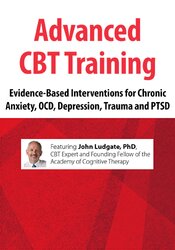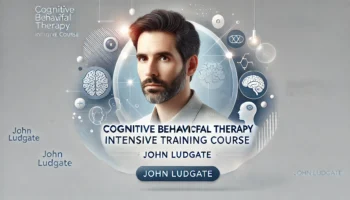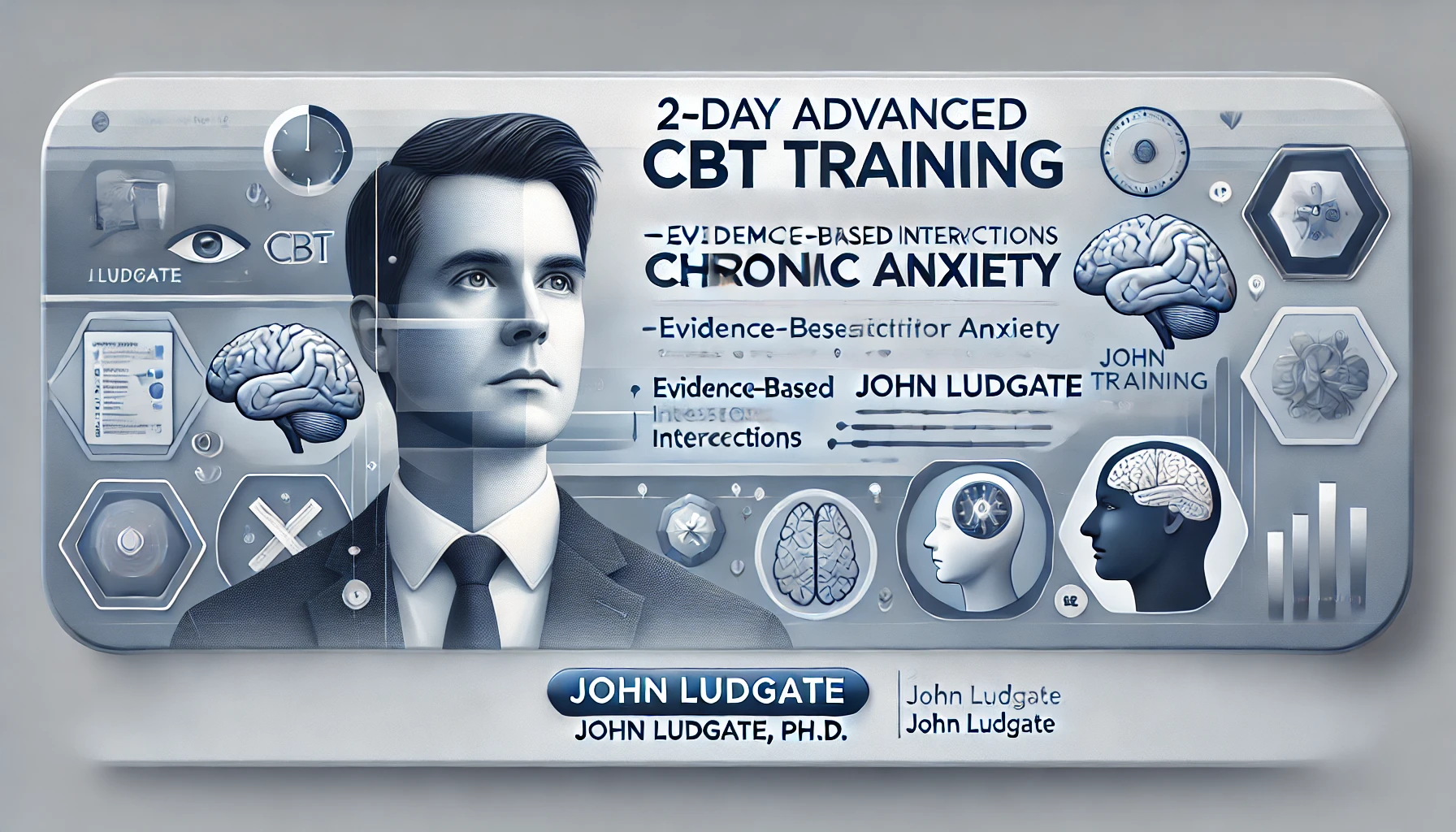2-Day -Advanced CBT Training -Evidence-Based Interventions for Chronic Anxiety, OCD, Depression, Trauma and PTSD – John Ludgate
2-Day -Advanced CBT Training -Evidence-Based Interventions for Chronic Anxiety, OCD, Depression, Trauma and PTSD – John Ludgate has the same quality as the author’s salapage.
Overview
Discover the Best Learning with 2-Day -Advanced CBT Training -Evidence-Based Interventions for Chronic Anxiety, OCD, Depression, Trauma and PTSD – John Ludgate
WisMentor is your ultimate destination for online learning. Explore "2-Day -Advanced CBT Training -Evidence-Based Interventions for Chronic Anxiety, OCD, Depression, Trauma and PTSD – John Ludgate" by top authors and instructors, designed to transform your skills and career. Start now and unlock your potential!
Salepage check: 2-Day -Advanced CBT Training -Evidence-Based Interventions for Chronic Anxiety, OCD, Depression, Trauma and PTSD
Author: John Ludgate
- Faculty:
- John Ludgate
- Duration:
- 13 Hours 7 Minutes
- Format:
- Audio and Video
- Copyright:
- Nov 24, 2020
Description
Cognitive Behavioral Therapy (CBT) is an evidence based treatment that is one of the most effective treatments for chronic, recurring, and challenging mental health issues such as:
- Anxiety
- OCD
- PTSD
- Depression
Now, the opportunity is yours to learn this powerful modality in a comprehensive online course from CBT expert and author John Ludgate, PhD. Dr. Ludgate is a Founding Fellow of the Academy of Cognitive Therapy and trained under Cognitive Therapy’s founder Dr. Aaron Beck at the Center for Cognitive Therapy.
In this intensive online CBT training course, you’ll be provided with a proven set of clinical tools and skills that can enhance your practice – from the basic CBT skills you might have learned early in your career to more advanced CBT techniques applied to a range of disorders.
CBT techniques can sometimes seem deceptively simple to apply but in actual clinical practice it requires demonstrable skills in three areas.
- Conceptualizing client’s presenting problems from a CBT perspective,
- Selecting appropriate interventions consistent with the case formulation, and
- Delivering these interventions and techniques systematically and with maximum effectiveness.
This training will assist you in developing skills in all three areas.
Dr. Ludgate will show how to overcome common obstacles frequently encountered in doing CBT with clients with different disorders.
- Improve your clients’ therapeutic experience with CBT interventions that are consistently shown to be effective.
- Utilize a fresh set of clinical tools and skills that can improve your practice, and treatment outcomes.
Handouts
| Manual – 2-Day Advanced CBT Training (4 MB) | 113 Pages | Available after Purchase |
Outline
Cognitive Behavioral Therapy: Exploring the Model
- Empirical support for CBT
- Limitations of the research and potential risks
- Evolution of CBT from its initial model to the expanded
- CBT’s influence on the development of other models (ACT, DBT, schema therapy)
Assessment and Treatment Planning Through the Lens of CBT
- Cross-sectional
- Longitudinal conceptualization
- Issues in case formulation
Behavioral Interventions
- Behavioral activation
- Graded assignments
- Pleasure scheduling
- Problem solving
Cognitive Interventions
- Identifying core beliefs
- Eliciting negative thoughts
- Recognizing cognitive distortions
- Use of reframing
The CBT Session, Step-by-Step
- Fostering the therapeutic alliance
- Collaboration
- Structure and agenda setting
- Feedback
- Guided discovery
- Homework
CBT with Depressive Disorders
- Psychoeducation
- Transforming anhedonia, feelings of worthlessness, and low self-esteem
- Helping clients overcome low energy, fatigue
- Problem solving strategies to provide solutions to daily problems
- Relapse prevention
- Crisis intervention for active and passive suicidal ideation
CBT with Bipolar and Related Disorders
- Psychoeducation
- Management of manic symptoms
- Mood rating and monitoring
- Identification of triggers and prodromal symptoms
- CBT for medication compliance
- Overcoming sleep disturbance
CBT for Anxiety Disorders
- CBT’s role in managing anxiety and worry
- Reducing physiological effects of anxiety
- Disrupting rumination, anxiety spirals, and more
- Generalized Anxiety Disorder: cognitive and behavioral interventions
- Panic Disorder: Situational and interoceptive exposure
- OCD: Exposure and Response Prevention (ERP)
- PTSD: Prolonged Exposure (PE) and Cognitive Processing Therapy (CPT)
- Social Anxiety Disorder: Exposure and Cognitive Approaches
Special Issues
- Multicultural consideration
- Interpersonal and family issues
- Other common issues in treatment delivery
Faculty

John Ludgate, Ph.D. Related seminars and products: 7
Licensed Psychologist/Psychotherapist
Private Practice
John Ludgate, Ph.D., is a licensed clinical psychologist who has worked as a psychotherapist for almost 30 years. He is a Founding Fellow of the Academy of Cognitive Therapy. His practice, which involves work in both a private practice and in an outpatient psychiatric center, consists largely of treating clients referred with mood problems and/or anxiety conditions. He is currently working at the Cognitive-Behavioral Therapy Center of Western North Carolina in Asheville, North Carolina.
John is a native of southern Ireland and obtained a Master Degree in Clinical Psychology from the University of Edinburgh in Scotland, and a Ph.D. from Trinity College, Dublin, Ireland in 1990. He trained at the Center for Cognitive Therapy in Philadelphia under Dr. Aaron Beck, the founder of Cognitive Therapy, obtaining a Post-Doctoral Fellowship in Cognitive Therapy from the University of Pennsylvania in 1986. He subsequently became assistant director of training at Dr. Beck’s Center.
In the early 1990’s, Dr. Ludgate was a research clinical psychologist at the University of Oxford in England and served as cognitive therapist in several outcome studies of panic disorder, agoraphobia, social phobia and hypochondriasis. He authored Cognitive Behavioral Therapy and Relapse Prevention for Depression and Anxiety (Professional Resources Press, 2009) and was co-editor with Wright, Thase and Beck of Cognitive Therapy with Inpatients: Developing a Cognitive Milieu (Guilford Press, 1993). His other books include Overcoming Compassion Fatigue (PESI, 2014 co-authored with Martha Teater and The CBT Couples Toolbox (PESI, 2018). He has written numerous journal articles and book chapters in the field of Cognitive Behavior Therapy for Anxiety and Depression. He has presented many seminars and workshops on cognitive behavioral approaches, both nationally and internationally.
Speaker Disclosures:
Speaker Disclosures: Financial: John Ludgate has an employment relationship with Cognitive Behavioral Therapy Center of WNC. He receives a speaking honorarium from PESI, Inc.
Non-financial: John Ludgate has no relevant non-financial relationship to disclose.
About 2-Day -Advanced CBT Training -Evidence-Based Interventions for Chronic Anxiety, OCD, Depression, Trauma and PTSD – John Ludgate and Our Expert Authors
2-Day -Advanced CBT Training -Evidence-Based Interventions for Chronic Anxiety, OCD, Depression, Trauma and PTSD – John Ludgate is part of our extensive collection of over 70,000 premium courses at WisMentor. Created by renowned authors and industry leaders, this course is tailored to provide cutting-edge knowledge and actionable insights.
Why Choose WisMentor?
- 🌟 Access courses from world-renowned authors.
- 📚 Wide range of topics to suit your professional and personal growth needs.
- 💼 Lifetime access and flexible learning options.
Key Features of 2-Day -Advanced CBT Training -Evidence-Based Interventions for Chronic Anxiety, OCD, Depression, Trauma and PTSD – John Ludgate:
- ✅ Comprehensive content covering essential topics.
- ✅ Evidence-based methodologies and practical examples.
- ✅ Learn at your own pace with expert guidance.
How to Access Your Course?
Getting started is easy:
- 📩 Receive an instant download link via email.
- 🌐 Access your course anytime through your account dashboard.
- 📱 Compatible with all devices for a seamless experience.
Need Help?
Our dedicated support team is here to assist you. Visit our Contact Us page or reach out via email for any queries or assistance.
More from Our Collection:
Don’t miss the opportunity to explore more courses from top authors and enrich your learning journey at WisMentor. Find your next course now and take your skills to the next level.
Curriculum
FAQs
Requirements
- Technical Needs: Access to a reliable internet connection and a device capable of streaming video content is necessary for online modules.
- Professional Experience: Prior experience in mental health practice or counseling is beneficial to grasp advanced CBT concepts effectively.
- Educational Background: Participants should possess a foundational understanding of psychology or counseling. A bachelor's degree in psychology, social work, counseling, or a related field is recommended.
Features
- Continuing Education Credits: Opportunity to earn CE credits upon successful completion, contributing to professional development requirements.
- Expert Instruction: Course material developed and delivered by seasoned professionals with extensive experience in CBT.
- Interactive Learning: Engaging case studies, role-playing scenarios, and practical exercises to reinforce learning.
- Comprehensive Curriculum: In-depth modules covering evidence-based CBT interventions tailored for chronic anxiety, OCD, depression, trauma, and PTSD.
Target audiences
- Healthcare Providers: Medical professionals interested in integrating CBT techniques into their practice to address mental health conditions.
- Graduate Students: Individuals currently enrolled in advanced psychology or counseling programs seeking specialized training.
- Mental Health Professionals: Licensed therapists, counselors, psychologists, and psychiatrists aiming to deepen their expertise in CBT.



